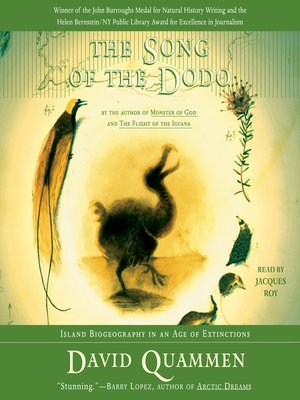

"I suspect you can see where we’re headed," Quammen writes. Turning to extinction events, Quammen gives many examples, including some of the more famous: the dodo, the passenger pigeon, the Japanese wolf. This in turn engenders others like allopatric speciation, a term the reader quickly becomes familiar with, meaning "when one species splits into two while the two sets of individuals are living in different places." This means that isolated spe-cies on islands evolve in a different direction until eventually they become a separate species, and thus rare, making their survival perilous. Quammen explores the "signature features" of island species and communities like geographical isolation. Part travel narrative, part natural history, and part biography, Song of the Dodo highlights the significance of islands in the geographical distribution of species around the planet. Song of the Dodo should be required reading for any student of the environment, and anyone living here in such a fragile ecosystem should be a student of the environment.

Perhaps most amazing is that among the jargon, the Latin, the scientific cataloging, and the lists, the reader is captivated. Quammen shows us that though not credited with it, Wallace was instrumental in constructing the complex picture of where species come from. Wallace, incredibly observant and detailed in his dangerous adventures, missed the insolent cabals of his colleague, Charles Darwin. One of the best stories is of the hapless, inquisitive, Alfred Russell Wallace on his expeditions around the Malay Archipelago. He begins with the role biogeography played in the construction of evolutionary theory.

Since islands contain species that are largely isolated from crossbreeding and have the most manifest examples of evolution, they were key to discoveries by early scientists like Darwin.įor the book, Quammen spent ten years following island biogeographers researching around the globe.

And as human activity continues to carve the wilderness into these ever-increasing islandlike fragments, we ensure more and more species' extinction. The major tenet of the book is that through development, we have made the planet into a series of biological islands. It is complex material, but through Quammen’s gentle handling, the reader feels securely moored in an ocean of dense science. It’s big, but in that space he manages to travel to the most remote spots on earth, chronicle wild scientific adventures, and explain the cause of worldwide ecosystem decay. That’s what Bozeman writer David Quammen attempts in his 700-page environmental epic, Song of the Dodo.


 0 kommentar(er)
0 kommentar(er)
